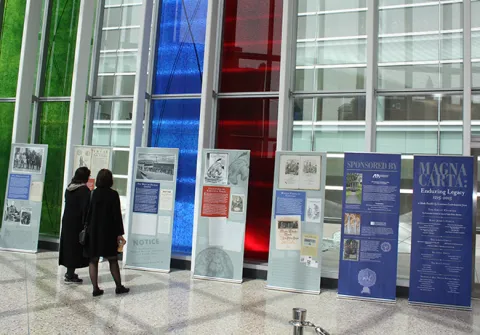
Two visitors examine a Magna Carta display at the Robert H. Jackson U.S. Courthouse in Buffalo.
For federal courts, Law Day 2015 will be an opportunity to educate the public about the rule of law, inspired in part by the 800th anniversary of the Magna Carta, which established the principle that no man or government is above the law.
Law Day, established in 1958, is officially honored May 1 but has evolved into a monthlong celebration across the nation. While some events, such as a public exhibit at a federal courthouse in Buffalo, New York, are focusing specifically on the Magna Carta, many courts are conducting events with students that illustrate how the rule of law affects lives today.
In four Eastern District of Pennsylvania courthouses, for instance, students will argue and decide a case adapted from the still-undecided Supreme Court case, Elonis v. U.S. In a fictional scenario, a high school student is charged with threatening two classmates in a Facebook post, but argues that the First Amendment protects his right to free speech. Guided by lawyers and federal judges, student attorneys will argue the case before a jury of fellow students.
“Our court’s choice of the Elonis case is based on its timeliness and relevance. Students grasp legal concepts with enthusiasm when the scenarios resound with familiarity,” said U.S. District Judge Cynthia M. Rufe. “In this scenario, the First Amendment and freedom of speech rights collide with the use, or abuse, of social media in cyber-bullying, and with the rights of individuals to be free from harassment.”
Rufe said the Elonis case is an example of how the Magna Carta’s core principles remain relevant, even as social structures change. “The Internet is a vast landscape of new issues not readily contemplated even by our Founding Fathers when they created the Constitution of the United States,” she said. “When the Magna Carta was written, it was, in part, to keep in check a despot king who at his whim tyrannized all. While its immediate impact was not appreciated, it became the template for due process.”
In the Robert H. Jackson United States Courthouse in Buffalo, a two-week lobby exhibit, scheduled to conclude April 21, is honoring the document that King John signed in 1215 at Runnymede, England. The king pledged to rebellious nobles that he would obey a specific charter of their rights.
While many of the Magna Carta’s specific points are arcane today, it was the first time the English monarchy accepted that it must adhere to limits under the law. Over the next 200 years, additional rights were grafted into the charter, including the phrases “due process of law,” and the right of all men to “lawful judgment of his peers.”
“It’s really a fundamental document on which our Constitution and Bill of Rights were founded,” said Chief Judge Frank P. Geraci Jr., of the U.S. District Court for the Western District of New York, following a recent courthouse event honoring the Magna Carta.
Other federal court Law Day programs include:
- At the Thomas F. Eagleton U.S. Courthouse in St. Louis, students will visit a court, meet with a federal judge and participate in a mock evidentiary hearing with attorney coaches. In classroom sessions before the Law Day visit, the students will learn about the Magna Carta, and how its principles affect rights in the age of technology. As an example, students will be asked what privacy they might expect while using a cell phone, and whether government intrusion is needed in some cases to protect public safety.
- In the greater Minneapolis area, federal judges and lawyers from the District of Minnesota will assist in a monthlong program that will include visits to 60 high school classrooms. This year’s program will focus on Thurgood Marshall, who argued Brown v. Board of Education before he later became the nation’s first African American on the U.S. Supreme Court.
The U.S. Courts Educational Resources section provides tools and activities for explaining the rule of law in daily life through examples that are meaningful to general audiences. A courtroom-ready, classroom-ready program explores landmark Supreme Court cases that reinforce the importance of the rule of law as it applies to unpopular viewpoints, the exercise of religion, participation in jury service, and access to public education.
Subscribe to News Updates
Subscribe to be notified when the news section is updated.
